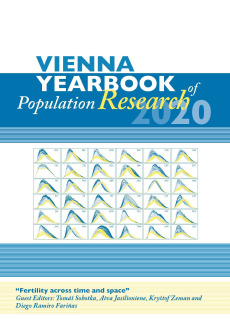Vienna Yearbook of Population Research / Vienna Yearbook of Population Research, 2020
Fertility Across Time and Space
Gastherausgeber: Diego Ramiro Fariñas, Gastherausgeber: Aiva Jasilioniene, Herausgegeben von Wolfgang Lutz, Gastherausgeber: Tomáš Sobotka, Gastherausgeber: Kryštof Zeman, Reihe herausgegeben von Institut für Demographie der Österreichischen Akademie der Wissenschaften
Serie: Vienna Yearbook of Population ResearchContents
Introduction
Introduction: the relevance of studying fertility across time and space . . . . 1
Tomas Sobotka
Debate
International political economy and future fertility trends . . . . . . . . . . . . . . 27
Alıcia Adsera
Moving out the parental home and partnership formation as social
determinants of low fertility . . . . . . . . . . . . . . . . . . . . . . . . . . . . . . . . . . . . . . . . . 33
Albert Esteve, Diederik Boertien, Ryohei Mogi, and Mariona Lozano
“Catching up with ‘compressed modernity”’ – How the values of
Millennials and Gen-Z’ers could reframe gender equity and
demographic systems . . . . . . . . . . . . . . . . . . . . . . . . . . . . . . . . . . . . . . . . . . . . . . . 39
Stuart Gietel-Basten
Future fertility trends are shaped at the intersection of gender and
social stratification . . . . . . . . . . . . . . . . . . . . . . . . . . . . . . . . . . . . . . . . . . . . . . . . . 43
Trude Lappegård
The wish for a child . . . . . . . . . . . . . . . . . . . . . . . . . . . . . . . . . . . . . . . . . . . . . . . . . 49
Anna Rotkirch
Fertility will be determined by the changing ideal family size and the
empowerment to reach these targets . . . . . . . . . . . . . . . . . . . . . . . . . . . . . . . . . . 63
Wolfgang Lutz
Marriage will (continue to) be the key to the future of fertility in Japan
and East Asia . . . . . . . . . . . . . . . . . . . . . . . . . . . . . . . . . . . . . . . . . . . . . . . . . . . . . . 71
Setsuya Fukuda
Review Article
Ultra-low fertility in East Asia: Confucianism and its discontents . . . . . . . . 83
Yen-hsin Alice Cheng
Research Articles
Laggards in the global fertility transition . . . . . . . . . . . . . . . . . . . . . . . . . . . . . 123
David Shapiro and Andrew Hinde
Projecting future births with fertility dierentials reflecting women’s
educational and migrant characteristics . . . . . . . . . . . . . . . . . . . . . . . . . . . . . . . 141
Michaela Potancokova and Guillaume Marois
Decomposing changes in first birth trends: quantum, timing, or variance . 167
Ryohei Mogi and Michael Dominic del Mundo
What factors support the early age patterns of fertility in a developing
country: the case of Kyrgyzstan . . . . . . . . . . . . . . . . . . . . . . . . . . . . . . . . . . . . . . 185
Konstantin Kazenin and Vladimir Kozlov
Marital fertility decline and child mortality in the Sardinian longevity
Blue Zone . . . . . . . . . . . . . . . . . . . . . . . . . . . . . . . . . . . . . . . . . . . . . . . . . . . . . . . . . 215
Michel Poulain, Dany Chambre, Pino Ledda, and Anne Herm
Future orientation and fertility: cross-national evidence using Google
search . . . . . . . . . . . . . . . . . . . . . . . . . . . . . . . . . . . . . . . . . . . . . . . . . . . . . . . . . . . . . 237
Nicolo Cavalli
Data and Trends
Selected Wittgenstein Centre databases on fertility across time and space . 267
Krystof Zeman and Tomas Sobotka

